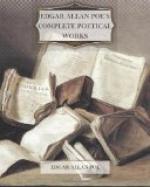Lal.
(after a pause). And—he—shall—die!—alas!
Castiglione
die? Who spoke the words?
Where
am I?—what was it he said?—Politian!
Thou
art not gone—thou art not gone,
Politian!
I
feel thou art not gone—yet dare not
look,
Lest
I behold thee not—thou couldst not
go
With
those words upon thy lips—oh, speak to me!
And
let me hear thy voice—one word—one
word,
To
say thou art not gone,—one little sentence,
To
say how thou dost scorn—how thou dost hate
My
womanly weakness. Ha! ha! thou art not
gone—
Oh,
speak to me! I knew thou wouldst not go!
I
knew thou wouldst not, couldst not, durst not
go.
Villain,
thou art not gone—thou mockest me!
And
thus I clutch thee—thus!—He is
gone, he is gone—
Gone—gone.
Where am I?—’tis well—’tis
very well!
So
that the blade be keen—the blow be sure,
’Tis
well, ’tis very well—alas!
alas!
V.
The Suburbs. POLITIAN alone.
Politian. This weakness grows upon
me. I am fain
And
much I fear me ill—it will not do
To
die ere I have lived!—Stay—stay
thy hand,
O
Azrael, yet awhile!—Prince of the Powers
Of
Darkness and the Tomb, oh, pity me!
Oh,
pity me! let me not perish now,
In
the budding of my Paradisal Hope!
Give
me to live yet—yet a little while:
’Tis
I who pray for life—I who so late
Demanded
but to die!—What sayeth the Count?
Enter Baldazzar.
Baldazzar. That, knowing no cause
of quarrel or of feud
Between
the Earl Politian and himself,
He
doth decline your cartel.
Pol. What didst thou say?
What
answer was it you brought me, good Baldazzar?
With
what excessive fragrance the zephyr comes
Laden
from yonder bowers!—a fairer day,
Or
one more worthy Italy, methinks
No
mortal eyes have seen!—what said
the Count?
Bal. That he, Castiglione,
not being aware
Of
any feud existing, or any cause
Of
quarrel between your lordship and himself,
Cannot
accept the challenge.




